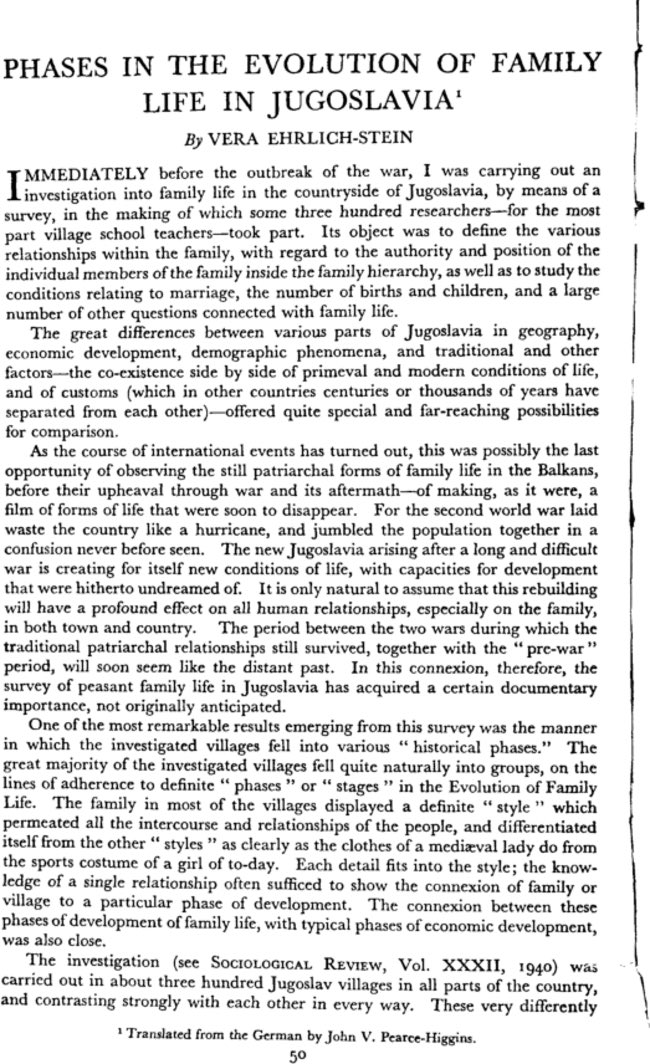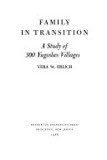Research that inspires - thread
In the 1930s Vera Stein Erlich, a social researcher & reformer from a Jewish family in Zagreb, interested in women's rights & in nonviolent education, studied families, gender relations & violence across her country, multi-confessional Yugoslavia.
In the 1930s Vera Stein Erlich, a social researcher & reformer from a Jewish family in Zagreb, interested in women's rights & in nonviolent education, studied families, gender relations & violence across her country, multi-confessional Yugoslavia.
It was a huge research project. She had to smuggle it out of war-time Yugoslavia & published it much later after the war.
Erlich designed an anthropological survey to investigate how family norms varied among different regions and among the country’s different religious groups.
Erlich designed an anthropological survey to investigate how family norms varied among different regions and among the country’s different religious groups.
The survey was sent to hundreds of villages & was “painstakingly filled in” by teachers & doctors, who became the most enthusiastic of assistants and oral historians. Soon Erlich had access to an immense amount of material in the form of 305 surveys suitable to comparative study.
Erlich's findings on where domestic violence was most common were striking: where traditional families broke down, but new family structures (nuclear, more egalitarian gender relations) had not yet established themselves: in the 1930s this was happening in Croatia & Serbia.
In families in Serbia & Croatia, the patriarchal zadruga, the “old order”, was breaking up under the pressure of what she called the new money economy. This brought “knowledge of greater individual freedom” to young people & women & growing opposition to societal & family norms
The unequal socialization of male & female children, and of systemic male violence against women & children, are recurrent themes in Ehrlich’s book.
The story of Vuka, for instance – a peasant woman who was passionate about learning, but unable to continue school ...
The story of Vuka, for instance – a peasant woman who was passionate about learning, but unable to continue school ...
... & was forced to marry an abusive man – was collected by a female teacher from Serbia. Vuka placed high hopes in education & asked the teacher to help her female child by “teaching her the right things,” namely “not to be a martyr as I was.”
“Challenging the idea that “romantic love” was an artificial invention ... Vera Stein Erlich investigated love relations among illiterate Yugoslav peasants, adopting a universalistic, humanist stance on love relations."
More: http://www.europa.clio-online.de/site/lang__de/ItemID__547/mid__11428/40208214/default.aspx
More: http://www.europa.clio-online.de/site/lang__de/ItemID__547/mid__11428/40208214/default.aspx
Ehrlich inspired @ESI_eu research on gender relations in Kosovo villages in 2006:
https://www.esiweb.org/publications/cutting-lifeline-migration-families-and-future-kosovo
And this ESI documentary on 2010: http://magazine.erstestiftung.org/en/cutting-the-lifeline/
2010: http://magazine.erstestiftung.org/en/cutting-the-lifeline/
@erstefoundation @BorisMarte @ORF
https://www.esiweb.org/publications/cutting-lifeline-migration-families-and-future-kosovo
And this ESI documentary on
 2010: http://magazine.erstestiftung.org/en/cutting-the-lifeline/
2010: http://magazine.erstestiftung.org/en/cutting-the-lifeline/@erstefoundation @BorisMarte @ORF

 Read on Twitter
Read on Twitter





